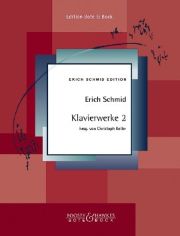Still to be discovered as a composer
Christoph Keller has published the piano music of Erich Schmid in two volumes.

The conductor Erich Schmid probably needs no introduction to the older generation. As conductor of the Tonhalle Orchestra Zurich and the Beromünster Radio Orchestra, he held a central position in Swiss musical life for many years after the Second World War. And between 1968 and 1978, he was also increasingly active as a guest conductor with various English orchestras.
The fact that Schmid was also a prolific composer, at least in the 1930s, is probably less well known. A CD box set published by ZHdK-Records in 2013 offers a good introduction to the music of this busy composer (ZHdK-Records 30/2013). The pianist Christoph Keller recently published Erich Schmid's piano music in two volumes with Boosey & Hawkes/Bote & Bock.
Even the early Little music for piano from 1926 reveals a lot about Schmid's compositional potential. Two of the three short pieces are written with a great deal of youthful verve and mischief, while the middle piece (slow and expressive) reveals an astonishing lyrical talent. With the Three piano pieces from 1929, Schmid then ventured into free atonality.
"So I compose ... piano pieces that I can't play," he wrote to his friend Erich Itor Kahn. In fact, the three thoroughly fascinating sound sketches are not easy to realize pianistically; smaller hands will encounter great difficulties.
The following Six pieces for piano op. 6 are clearly influenced by Schmid's famous composition teacher Arnold Schönberg. On the one hand, it is admirable how confidently the 25-year-old pupil has already mastered the twelve-tone technique, but on the other hand, craftsmanship is very much to the fore. The composer does not escape certain stereotypes (such as his preference for descending phrases).
The 1941 Splitter show a completely different Schmid: a march, a waltz and a foxtrot contrast with song arrangements and an enchanting berceuse. "With their comparatively easy playability, the pieces are suitable as an introduction to a piano oeuvre that still awaits discovery in large parts", writes editor Christoph Keller rightly about these Splitter.
And anyone who wants to take a closer look at Erich Schmid and his work will be very well served by these two booklets. In addition to a detailed critical report, reviews of his works and facsimiles, they also contain a biography that is well worth reading.
Erich Schmid: Piano Works 1 and 2, edited by Christoph Keller, Works 1, BB 3545; Works 2, BB 3546; € 55.00 each; Boosey & Hawkes / Bote & Bock, Berlin (Schott, Mainz)









